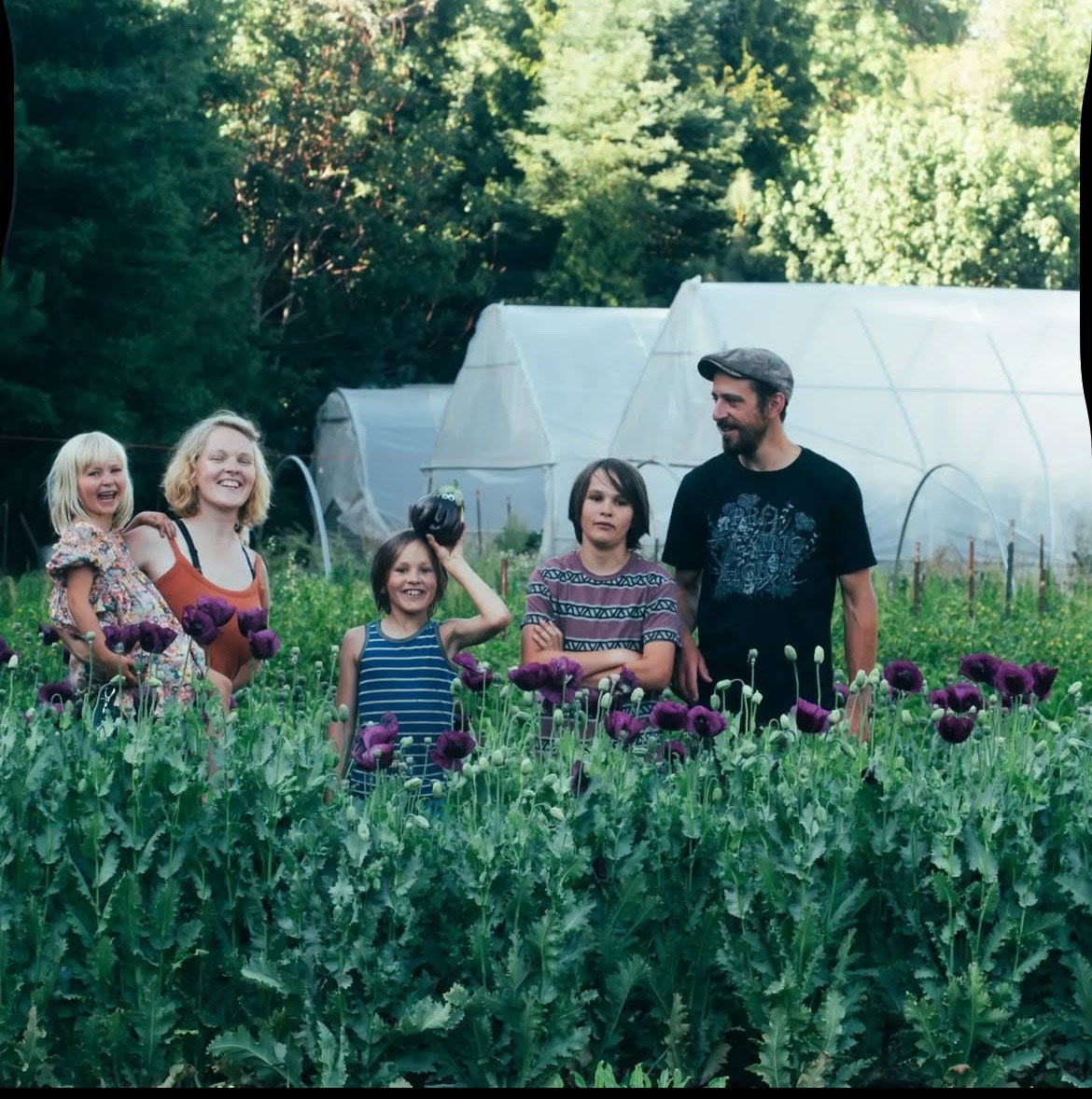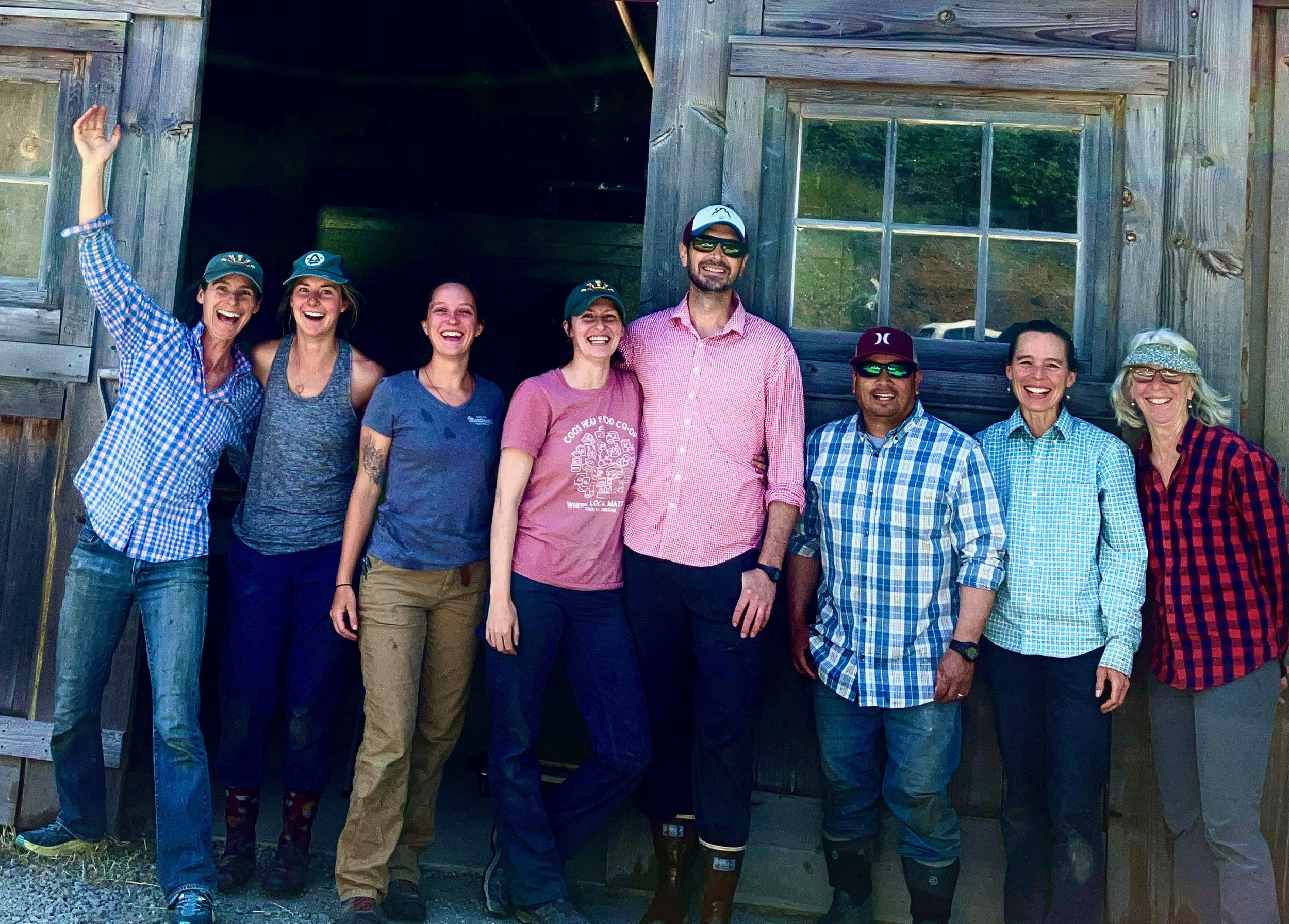Good Rain Farm- FULL FOR 2025
2 APPRENTICESHIPS
PART TIME (24 hours/week)
APPROX START/END DATES: May - October
$18/HR
LOCATION: Troutdale (Portland Metro Chapter)
YEARS IN PRODUCTION: 9
PREVIOUS YEARS HOSTING: New Host Farm
PRACTICES: Low-Till, Organic Practices (Not Certified)
ACRES IN CULTIVATION: 1
Vegetables, Culinary Herbs, Meat Production, Seed Production
ON-FARM HOUSING? No
VEHICLE REQUIRED? Yes
LANGUAGES SPOKEN: English
BIPOC Owned/Operated, Women Owned/Operated
Good Rain Farm is a diverse operation focused on vegetable production, native plant propagation, and Indigenous First Foods. We primarily grow mixed vegetables and Indigenous crops, cultivating them through sustainable practices such as low-till methods, cover cropping, and regenerative soil care. Our marketing and sales outlets include a CSA program, local farmers markets, and direct-to-community sales. Our CSA, Save Our Seed, prioritizing culturally relevant foods and education.
Training future farmers is essential to sustaining our food systems, and it’s critical to build a qualified, skilled workforce that values sustainable, culturally rooted practices. Mentoring Apprentices aligns with our mission to strengthen the community through hands-on education and cultural stewardship, helping to ensure a resilient, knowledgeable, and inclusive agricultural future.
FARM OVERVIEW
Good Rain Farm is located on 13.5 acres within the Urban Growth Boundary (UGB) and designated rural agricultural reserves, just 10 minutes from Gresham and Troutdale, Oregon. The farm includes 10 open-field acres dedicated to mixed vegetable production, providing a spacious and productive setting for diverse crops. Our proximity to the Sandy and Columbia Rivers adds to the richness of the environment, offering opportunities for recreational activities and connection to local natural resources. The setting provides both a quiet, rural atmosphere and convenient access to nearby communities, making it ideal for sustainable farming and community engagement. Currently farm owner Michelle Week and partner live on site with 1 dog, several cats, and meat rabbits.
Our production is a blend of mechanization and hand labor, using tools like a BCS walk-behind tractor for efficiency while maintaining soil health. We use cover crops to enrich soil and support biodiversity, and we are committed to organic practices, exploring organic certification to enhance transparency.
Our typical farm crew includes Michelle and seasonal Apprentices who engage in all aspects of the farm’s operations. We prioritize training Apprentices in sustainable methods, food sovereignty, and cultural revitalization, aiming to foster skilled farmers who carry forward these values. Community volunteers also join us seasonally, helping with planting, harvesting, and community events that support our broader mission of sustainable, inclusive agriculture.
Farmer Michelle Week, founder and steward of Good Rain Farm, is a first-generation farmer from the sngaytskstx (Sinixt) Arrow Lakes Peoples. With a foundation in outdoor recreation and gardening, she refined her skills through a Farm Apprenticeship at Zenger Farm, which led her to establish Good Rain Farm to increase access to Indigenous First Foods.
Michelle’s philosophy centers on food sovereignty, cultural revitalization, and environmental stewardship. Good Rain Farm was established in 2018 to blend traditional knowledge with sustainable farming, fostering ecological health and community resilience. Michelle’s goals include creating an inclusive food system, expanding education, and training future farmers who prioritize community and sustainability.
TRAINING AND EXPECTATIONS
Apprentices at Good Rain Farm will engage in a variety of tasks throughout the six-month Apprenticeship, including field work such as planting, cultivating, weeding, and harvesting, as well as care for livestock, including feeding and cleaning of our meat rabbits. Training will include 48 hours of classroom instruction (typically offered in 3hr weekly chunks) covering essential topics like crop planning, irrigation, seed saving, and soil fertility. Apprentices will also learn practical skills in washing and packing produce, basic marketing principles through CSA interactions, and safe equipment use and maintenance. Additionally, they will contribute to social media marketing and newsletter writing, enhancing their communication skills and understanding of farm promotion. While the focus is more on agricultural skills than business operations, Apprentices will receive a list of resources and recommendations for additional entrepreneurial education, and time to attend workshops can be accommodated. The program aims to provide a well-rounded experience, fostering both hands-on agricultural skills and an understanding of sustainable farming practices while encouraging collaboration and active participation.
Apprentices at Good Rain Farm are expected to commit to three eight-hour training days per week, starting around 7-8 AM and ending around 3-4 PM, with appropriate breaks included. Farm activities are predominantly performed outdoors in various weather conditions, so employees must dress appropriately each day and wear closed-toed shoes. The role involves significant physical exertion, requiring frequent bending, lifting, and handling of heavy equipment and supplies, with the ability to lift up to 50 pounds repeatedly throughout the day and stand for extended periods outdoors especially during soil amendment & cover cropping days. Reasonable accommodation may be provided upon request to support apprentices in meeting these physical demands.
To provide effective instruction and mentorship to an Apprentice, Michelle will use a hands-on approach that combines lecture, demonstration, collaboration, and open communication. Michelle will teach core concepts and skills through practical work, engaging the Apprentice in daily tasks while guiding them with clear explanations. Regular field walks will facilitate discussions about observations and questions, enhancing their understanding. Michelle will schedule regular check-ins to assess progress and address challenges, fostering an environment where the Apprentice feels safe to share concerns. Michelle aims to provide consistent positive reinforcement alongside constructive criticism, balancing firmness with gentleness. While the work is urgent, Michelle emphasizes that growth and learning are ongoing processes. Evaluation sessions will reflect on progress and set goals, ensuring the Apprentice gains confidence and independence as they develop their skills.
QUALIFICATIONS
We are seeking applicants with a minimum of one year of outdoor field worker or farm experience that includes direct involvement in farm operations, with a focus on supporting and executing activities directed by the Lead Instructor or Farm Managers. Ideal candidates should have a working knowledge of organic, sustainable, small farm practices and a passion for learning about Native First Foods, alongside a commitment to land stewardship. Excellent verbal and written communication skills, competency with mathematics, and the ability to follow verbal instructions are essential. Additionally, applicants should be comfortable within a community-driven management process and demonstrate a strong work ethic, enthusiasm for lifelong learning, and an open mind. A food handler's card is preferred but not required.
COMPENSATION / ACCOMMODATIONS
For our Apprenticeship position(s), we offer $18 per hour for three 8-hour workdays weekly, plus several benefits to enrich the experience. Apprentices receive a seasonal CSA box, Paid Time Off, Paid Sick Days, and a Gear Stipend to ensure they’re well-supported. We maintain a Hydration Station and snack basket (“snasket”), provide occasional hot lunches, and offer access to a network of educational and farming opportunities. Technical support for scholarships, grants, and other resources is available, along with comprehensive on-the-job training that emphasizes both practical farming skills and Indigenous approaches to agriculture. Together, these benefits create a holistic, supportive environment for Apprentices to thrive and prepare for futures in sustainable agriculture.
EQUITY AND INCLUSION
At Good Rain Farm, equity and inclusion mean fostering a safe, welcoming, and empowering environment for all, particularly BIPOC and Queer individuals. Our Apprenticeship offers specialized training from an Indigenous-led perspective, promoting diversity and skill-building. We ensure accessibility with 50% of CSA memberships offered at reduced or no cost and by providing home delivery for those in need. Through culturally relevant programs like our Save Our Seed CSA, which teaches seed saving and sustainable agriculture, we advance food sovereignty and social justice. Our commitment to fair treatment, accessibility, and cultural reclamation reflects our belief that equitable food access and environmental stewardship are essential for a just community.
Michelle Week (Photo Credit: Jaimie Thrower)












